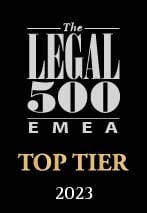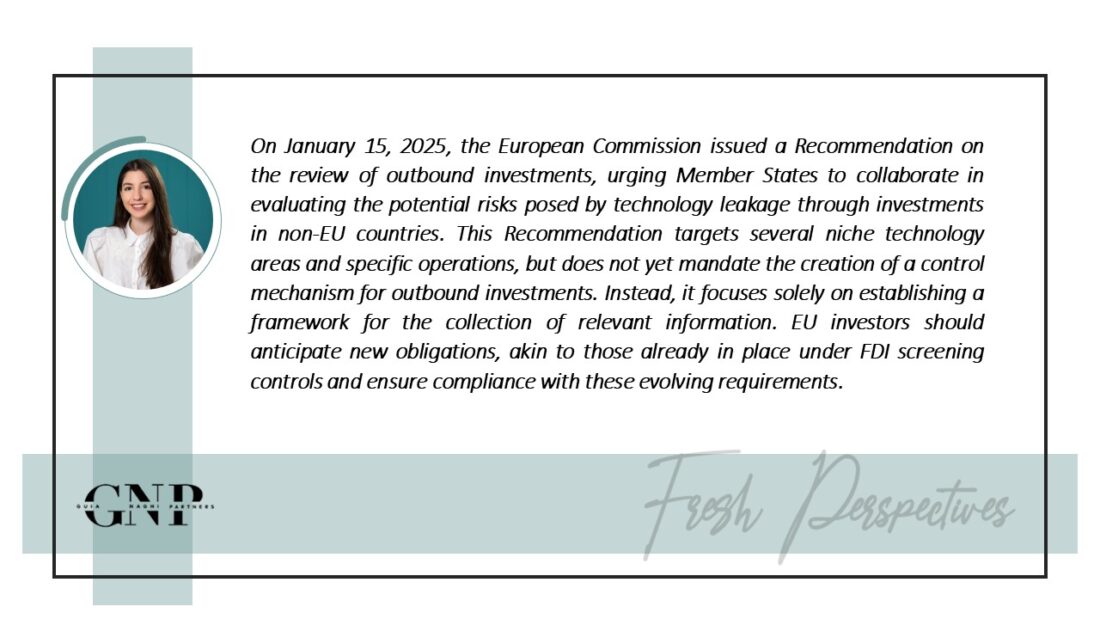Andreea Ivăniș – Quo Vadis? – The EC Recommendation on reviewing outbound investments
On January 15, 2025, the European Commission published the Recommendation (EU) 2025/63 on reviewing outbound investments in technology areas critical for the economic security of the Union[1] (‘the Recommendation’). This initiative seeks to gather detailed information on European investments in third countries, with a focus on assessing risks related to technology ‘leakage’ that could threaten European security.
This issue was already raised in the 2024 White Paper on Outbound Investments[2], which highlighted concerns over the transfer of sensitive technologies and know-how to countries that might exploit them for military or strategic purposes against the European Union (‘EU’). While export controls and foreign direct investment (‘FDI’) screening mechanisms are already in place, EU outbound investments have not been systematically monitored. The White Paper called for a robust data collection framework to understand these risks better—without immediately introducing new regulations.
The newly issued Recommendation proposes a reporting mechanism to track European investments in non-EU countries, Member States being able to prioritize reviews based on the risk profile of individual countries, taking into account their historical compliance with international norms such as the UN Charter. The goal is to safeguard European security by identifying key areas and high-risk transactions.
- Key areas under scrutiny
The Recommendation focuses on three critical technology areas:
- Semiconductor technologies;
- Artificial intelligence;
- Quantum technologies.
These areas are considered high-risk due to their strategic significance and the potential for misuse in military or intelligence applications. Given their important role in cutting-edge technological advancements, investments in these areas will face heightened scrutiny to prevent technology transfer to non-EU actors which could undermine European security.
2. Defining investments: what falls under scrutiny?
The Recommendation clarifies that an investment generally refers to operations aimed at acquiring, holding or managing assets, with the expectation of gaining control or effectively participating in the management of the target undertaking. However, certain operations are excluded, such as:
- Bank lending;
- Clearing and payment services;
- Underwriting and debt rating;
- Prime brokerage and global custody;
- Equity research and analysis.
Therefore, the focus is on direct or indirect[3] transactions that grant decision-making power, such as:
| Acquisitions | gaining control or participation in a company’s management through the purchase of a company or stake. |
| Mergers | the absorption of one or more companies or the combination of companies to form a new entity. |
| Asset transfer | the transfer of tangible or intangible assets (such as intellectual property or know-how) necessary for an economic activity, excluding dual-use products regulated under EU 2021/821. |
| Greenfield investments | the creation of a new business, subsidiary, branch or similar ventures. |
| Joint venture | the establishment or investment in an undertaking that combines resources with another party for a joint entrepreneurial goal. |
| Venture capital | providing capital linked to intangible benefits like management support, access to networks and enhanced financing, specifically targeting investments in identified technology areas. |
Building on these considerations, it is clear that the emphasis is placed on analyzing operations that grant decision-making authority over the investments. Therefore, the Recommendation excludes from its scope investments that do not confer such control and are solely aimed at generating a return on invested capital, such as portfolio investments.
3. Retroactive reviews & Reporting obligations
EU investors[4] must be prepared to report not only new or ongoing investments but also those already completed starting from January 1, 2021. The Recommendation further allows Member States to extend the review to transactions prior to this date if they identify concerns that warrant closer scrutiny.
Member States are tasked with establishing a system for reviewing investments, which may require either voluntary or mandatory disclosure of relevant transaction details. The information to be reported includes:
- Parties involved in the investment: details regarding the parties, including their place of incorporation, ultimate ownership, and country of origin;
- Investment details: the type and value of the investment, including the equity stake and voting rights (if applicable);
- Products/services/technologies involved: a description of the investment’s scope and the technologies, products or services involved;
- Contractual arrangements: information on any research and development agreements, intellectual property licensing and movement of key personnel linked to the investment;
- Investment timeline: the planned or completed date of the investment;
- Previous/announced transactions: information regarding any prior or announced transactions involving the parties;
- Public funding: details of any EU or Member State funding provided to the investing entity in relation to the technology areas concerned.
- Assessing investment risks
The review process will be conducted on a case-by-case basis, considering various factors such as the context of the transaction, the maturity level of the technology, its availability in the target country and the value and supply chains related to the technology.
Additionally, the evolution of associated risks, relevant technological developments and use cases will be considered. The global interconnectivity of the critical technology ecosystem, including research activities, will also be assessed. For transactions specifically related to certain technological areas, the undertaking’s participation in EU projects or programs will be evaluated.
- What lies ahead: EU and national level?
Given recent EU policy trends, EU investors should expect additional layers of scrutiny beyond existing FDI screening, merger control and Foreign Subsidies Regulation reviews.
While the Recommendation currently focuses on semiconductors, artificial intelligence and quantum technologies, the broader EU Economic Security Strategy also encompasses other areas. This could suggest a potential expansion of outbound investment reviews in the future.
Regarding national level scrutiny, Romania has not yet outlined its specific implementation strategy. It will be interesting to see how this mechanism will be applied at national level and whether the areas under consideration will be expanded or not.
The Recommendation marks a significant step in monitoring outbound investments in high-risk technology areas. While it does not impose immediate regulatory changes, it sets the stage for future EU and national level obligations. Investors should closely monitor developments, particularly as the EU refines its economic security framework.
[1] https://eur-lex.europa.eu/legal-content/EN/TXT/?uri=OJ:L_202500063;
[2] https://eur-lex.europa.eu/legal-content/EN/TXT/?uri=CELEX%3A52024DC0024.
[3] Indirect investments refer to investments made by an EU investor through a third-country entity acting as an investment vehicle, through an existing subsidiary, or within the framework of an existing joint venture with a company based in or from a third country;
[4] Natural or legal persons resident or established in the Union.





No Comments